UPD Average UK Home Broadband ISP Speeds Climb to 17.8Mbps – Ofcom
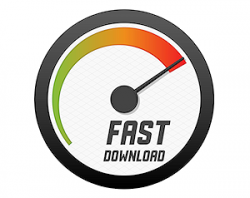
The telecoms regulator has today published its latest biannual report into the real-world Internet speeds of fixed line broadband ISP consumers across the United Kingdom, which reveals that the average download rate has risen to 17.8Mbps (up by +17.41% from 14.7Mbps in August 2013). Sadly a huge gap still exists between urban and rural areas.
Overall Ofcom’s report, which is based on a fairly small sample of real-world data sources collected using custom SamKnows monitoring routers during November 2013 (installed in 2,391 homes around the country and resulting in 735 million separate tests), clearly shows that Internet connectivity performance is continuing to improve. Even the average upload speed managed to climb from 1.8Mbps six months ago to 2.3Mbps now.
Advertisement
Most of the recent improvements have come from the growing uptake of BT’s 80Mbps capable Fibre-to-the-Cabinet (FTTC) lines and Virgin Media’s DOCSIS cable platform, the latter of which recently announced another round of speed boosts up to 152Mbps (here). BT are also examining Vectoring technology for a possible deployment this year (here), which could improve their FTTC performance.
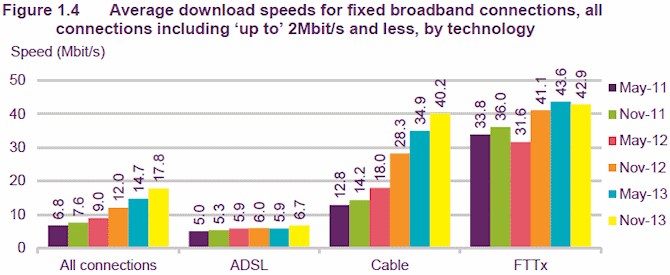
As usual the older / pure copper ADSL (up to 8Mbps) and ADSL2+ (up to 20/24Mbps) based broadband ISP lines haven’t shown much of an improvement, which is to be expected because in many cases they were already running at their best and doing so in a saturated market.
The deficiencies of ADSL have also contributed to the Digital Speed Divide between urban and rural areas, which exists because rural homes often connect via much longer copper lines and this slows the connection considerably (signal degradation). Rural areas are usually also the last to benefit from the latest NGA superfast broadband connections.
Ofcom’s “indicative analysis” shows that the average download speed in urban areas increased by 21% to 31.9Mbps in November 2013, almost three times the estimated average download speed in rural areas (11.3Mbps). By comparison the increase in download speeds for rural areas in the six months to November 2013 saw a change from 9.9Mbps to 11.3Mbps.
Advertisement
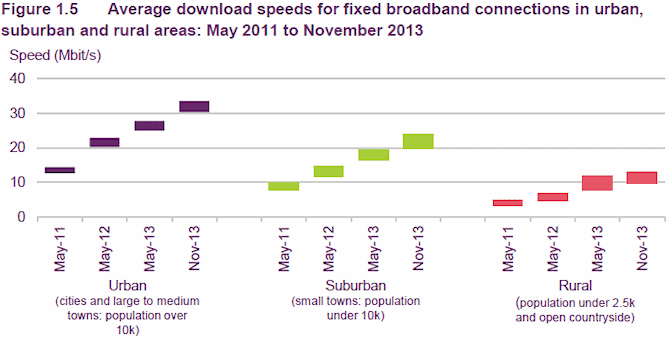
The good news is that the Government’s Broadband Delivery UK (BDUK) programme is working to make fixed line superfast broadband services available to 95% of the country by 2017, which when combined with Virgin Media’s upgrades should ensure that performance and coverage of faster connectivity continues to rise for at least the next few years. But truly remote rural areas in the final 5% might well have to wait even longer for a solution.
Meanwhile the proportion of broadband connections classed as “superfast” (i.e. offering an “advertised speed” of 30Mbps+) is also on the increase and has now hit 25% of residential broadband connections (up from a figure of 19% in August 2013).
A Look at Specific ISP Performance
So what about the ISPs themselves, how do they all perform? Unfortunately Ofcom’s report is based on such a small sample size that it can only reflect the performance of the largest broadband providers, which is an important consideration because smaller ISPs tend to pay more attention to quality.
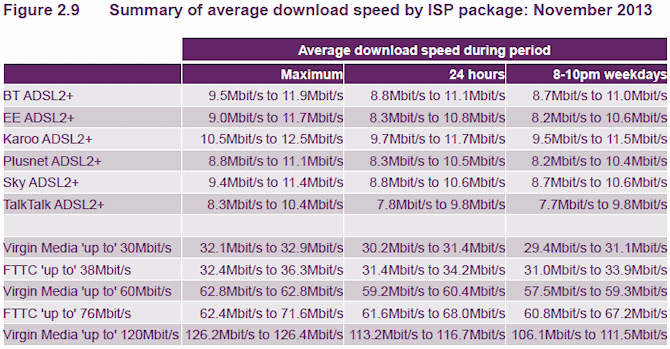
Overall it’s no surprise to find that ADSL2+ providers typically exhibit fairly similar performance across the board because they all suffer from the same basic limitations, although KC does seem to deliver a slightly more consistent performance than the others.
Advertisement
Meanwhile, on the superfast broadband (30Mbps+) front, Virgin Media’s 120Mbps package (this has since become 152Mbps) can still churn out the fastest download speeds, which is because the top headline speed of BT’s closest FTTC technology is by comparison just 80Mbps (note: BT’s 330Mbps FTTP service doesn’t show due to limited uptake and availability). Never the less BT’s FTTC products can still hold their own, albeit only up to a point.
It’s also worth taking a quick look at the latency performance of ADSL2+ and superfast broadband services. Latency is a measure of the time (delay in milliseconds, 1000ms = 1 second) that it takes for a single packet of data to travel from your computer to a remote server/computer and then back again (ping). Lower is always better (faster) and this measure is especially important for fans of online multiplayer games, where a low ping gives you smoother and more accurate gameplay.
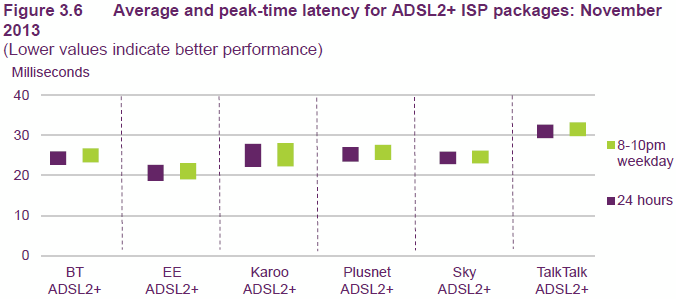
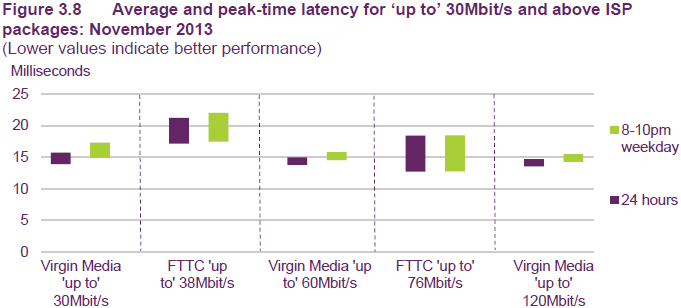
Generally speaking most of the ISPs, be they based on slower ADSL2+ or superfast (30Mbps+) technology, tend to exhibit similar performance levels. Meanwhile everybody is fairly level on the superfast front with little to tell them apart, although FTTC lines seem to show more variance.
Speed Complaints
So performance is improving, except if you’re stuck on one of those slower ADSL / ADSL2+ lines like most people, although occasionally people can experience significant problems with their speeds and when that happens it’s often important to be mindful of the relevant rules.
Firstly the Advertising Standards Authority, specifically their guidelines for tackling misleading promotions of “up to” broadband speeds (here), require ISPs to “demonstrate that [their] advertised speeds are achievable by at least 10% of users“. This is why so many providers now promote a “typical” speed (average performance based on that 10%) instead of the technologies top speed.
Meanwhile people who do suffer serious speed problems can sometimes get help through the regulators Voluntary Broadband Speeds Code of Practice (Version 2), which requires member ISPs (Listed Here) to explain to new customers the access line speed that they’re likely to achieve at home, and to try to resolve any problems when speeds fall significantly below the estimate. If the problem cannot be resolved then customers should be able to leave their ISP, without penalty, within the first 3 months of a new contract.
Ofcom are currently revising their speed code with some improvements for release later this year (here).
Ofcoms UK Fixed Line Broadband Speed Study (November 2013 Data)
http://stakeholders.ofcom.org.uk/../Fixed_bb_speeds_Nov_2013.pdf
UPDATE 12:42pm
The Government’s Communications Minister, Ed Vaizey, said: “Ofcom’s report confirms the remarkable transformation of UK Broadband currently underway. The UK has the best superfast coverage of all five leading European economies, and the news that average speeds continue to rise is tremendous news for homes and businesses alike. We are working hard to close the digital divide between urban and rural locations and are investing £790m to ensure that 95% of the UK will have access to superfast speeds by 2017.”
Mark is a professional technology writer, IT consultant and computer engineer from Dorset (England), he also founded ISPreview in 1999 and enjoys analysing the latest telecoms and broadband developments. Find me on X (Twitter), Mastodon, Facebook, BlueSky, Threads.net and Linkedin.
« 9 Extra Berkshire UK Villages to Get Superfast Broadband








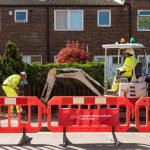













































Comments are closed